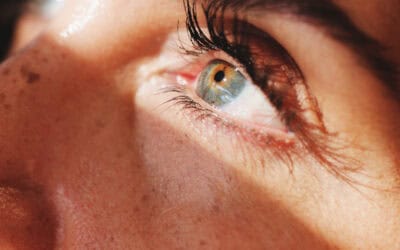Pittsburgh is an amazing city with many things to see, but winters here can be harsh. Average temperatures can drop as low as 24 degrees in January… well below freezing. While this isn’t as cold as other places, it can affect your health in many ways, including the health of your eyes and your ability to properly see this beautiful city. Here are some common questions about the effects of cold weather on your eye health along with answers from the ophthalmologists at Chang Eye Group.
Can Cold Air Hurt Your Eyes?
Yes. Cold air can dry your eyes out and can eventually cause damage to your corneas. If you are already prone to dry eyes, they may get worse in winter. If your eyes dry out in winter, you can use artificial tears to moisten your eyes. If this doesn’t work, talk to your eye doctor, who can prescribe alternatives. You can help prevent dry eyes by staying hydrated (we often drink less in winter), reducing screen time, and wearing wraparound sunglasses when you go outside.
Dry eyes may also cause your body to produce too many tears, which can be uncomfortable.
Can Snow Glare Hurt Your Eyes?
Pittsburgh gets a decent amount of snow every year. Snow can affect your eyes by producing high levels of glare, especially after a storm when the sky has cleared. Snow glare can be distracting and aversive (you want to look away from it) and can obscure objects, especially when driving. Snow glare makes life uncomfortable and driving more dangerous.
Snow can also cause snow blindness, which is the result of excessive UV exposure to your eyes. It can cause pain, watering or swelling in the eyes, headaches, a gritty feeling in your eyes, redness in your eyeballs and eyelids, eyelid twitching, and halos around lights (such as street lights). Snow blindness can also happen on white sand beaches, water, or around light-colored buildings. Usually, snow blindness goes away in a few days… during which you should not drive or wear contact lenses. Artificial tears can also help you recover.
A good rule of thumb is that if there is snow on the ground, wear sunglasses to reduce glare, improve your vision, and reduce your risk of snow blindness.
Is Digital Eye Strain Worse in the Winter?
Digital eye strain is caused by excessive screen use. It can sometimes be worse in the winter. If you rely a lot on natural light in a work area, be aware that the reduced light during the winter can increase screen glare. Adjust the screen brightness to avoid excessive contrast and consider trying a blue light filter. You may also have less eye strain if you setup and use task lighting.
If none of this works, invest in an anti-glare screen filter.
Can You Get a Cold in Your Eyes?
Sort of. Pink eye or conjunctivitis can be bacterial or viral. Conjunctivitis, like other infectious diseases, is more common in winter when people spend more time indoors. It’s spread through direct contact. Pink eye is unpleasant and can last as long as two weeks. Your eye doctor can help you diagnose and treat pink eye. Allergies can also cause similar symptoms, and you may need to talk to your family doctor about allergy testing.
The best way to avoid getting conjunctivitis is to wash your hands frequently with soap and water and avoid touching or rubbing your eyes. If you or your child has it, stay home until you are no longer contagious. Some forms of bacterial conjunctivitis can also be passed on to or from pets and other animals.
Does Driving or Walking in Falling Snow Cause Eye Strain?
It can. If snowfall is heavy, it’s best to avoid driving in it, as it can cause serious accidents. Falling snow can also be distracting and hard to focus through, sometimes causing mild eye strain.
Never drive if visibility is significantly reduced (blizzard or whiteout conditions).
How Can You Take Care of Your Eyes During the Winter?
There are a variety of things you can do to improve your eye health when the temperature drops. These include:
- Hydrate. We really do drink less during the winter. Water is the best beverage for hydration, but if you have difficulty drinking cold water during the winter, then warm it up slightly or opt for a decaffeinated herbal tea.
- Use a humidifier. A humidifier in your bedroom and possibly other living areas will help keep your eyes from drying out. It will also help prevent other issues such as chapped lips or winter rash on the back of your hands.
- Wear sunglasses every time you go outside. Wraparound sunglasses offer the best protection and should always be worn if engaging in winter sports.
- Wash your hands regularly and avoid touching your eyes. Don’t share towels or other personal items with other members of your household.
- Avoid rubbing your eyes, which can cause irritation, especially if your eyes are dry.
- Take breaks when working at a computer and take other ergonomic steps, such as task lighting or a glare filter, to reduce digital eye strain.
- Use over-the-counter artificial tears if your eyes are feeling dry or if you know the weather is likely to make them dry.
- If you wear contacts, consider switching to glasses when it is very cold. Soft contacts you replace each day are also often a better choice.
- Avoid pointing car vents directly at your face. Heat on your eyes can also dry them out. Likewise, avoid sitting too close to home heating vents or your fireplace.
- If there’s snow on the ground, wearing a hat with a brim can also help reduce glare.
How Can You Treat Dry Eyes?
If your eyes are dry, red, irritated or watering, you likely have dry eyes. There are some things you can do yourself. The first thing to try is over-the-counter artificial tears. You can get these at any drug store. Another thing to try is putting a warm compress on your eyes. You can just soak a washcloth in warm water and apply it to your closed eyes for 10 minutes. This helps increase eye lubrication and tear quality.
If these remedies don’t work, you should contact an experienced and local eye doctor such as the team at Chang Eye Group. We can help by providing prescription eye drops which are stronger than over-the-counter products. We can also complete a comprehensive eye exam to make sure your dry eyes are not being caused by allergies or conjunctivitis.
If you have persistently dry eyes this winter, schedule an appointment with Chang Eye Group or contact us to find out more about how we can help you keep your eyes healthy all year long.






